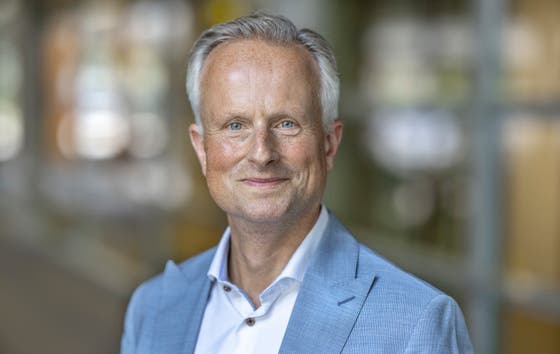'Paediatric radiologist: we contribute to optimal care'

Well-supported guidelines for paediatric radiological imaging are needed to ensure the best care for children, Professor of Paediatric Radiology Rutger Jan Nievelstein recently stated in his inaugural address. This requires sound scientific research. After all, children have a different range of conditions than adults, such as congenital defects, hereditary and metabolic diseases, and certain types of tumours. The new chair that will strengthen this scientific research falls under the strategic theme Child Health and supports the enhancers image-guided interventions and integral complex care for children.
A paediatric radiologist performs imaging studies, clarifies whether a child is ill and makes diagnoses. He also thinks about treatment and uses imaging to monitor whether the treatment is effective. "The beauty but also the challenge of paediatric radiology is that it includes imaging of the whole body and all organ systems," says Rutger Jan. As a paediatric radiologist, you oversee the whole child. This has actual advantages because conditions involving multiple bodily systems, such as congenital malformations and metabolic diseases, are relatively common in children.
Within the strategic theme Child Health, the team of paediatric radiologists is actively involved in scientific research within the various focus areas. "This involves joint research, sometimes as a leader and sometimes as a partner in the interpretation of radiological imaging" explains Rutger Jan Nievelstein. Examples include research in liver tumours and congenital heart defects led by Anneloes Bohté, in abdominal tumours led by Annemieke Littooij, in skeletal and soft tissue disorders led by Simone ter Horst, in neurological disorders led by Maarten Lequin, and in haematological disorders led by Rutger Jan Nievelstein. In particular, this research focuses on optimising and validating existing and new imaging techniques.
Innovative research
A relatively new field of research that Rutger Jan is involved in is about the role of imaging in identifying early and late disease and therapy-related side effects. For example, infectious diseases are nowadays a serious complication of treatment for children with cancer and with immune disorders or chronic lung disease. An example is children undergoing stem cell transplantation because of leukaemia. They have an increased risk of developing fungal infections in the respiratory tract, nasal sinuses and brain with risk of severe tissue damage and even death. Early detection of these infections is therefore of great importance to initiate timely treatment, and imaging plays an important role in this regard. In addition, Rutger Jan is involved in research into the normal and abnormal development of children using imaging. This research is important for better understanding disease mechanisms, predicting long-term outcomes and developing prevention and treatment.
Importance of working together
Nievelstein: "Within the Netherlands, intensified cooperation between the seven paediatric radiology centres is being pursued to improve care, training and science." Collaboration with other disciplines and institutions within and outside the Netherlands, as well as with patients and their carers, is essential to advance paediatric radiology in the care process, with the ultimate goal of a long-term healthy life for all children. UMC Utrecht/Wilhelmina Children's Hospital, together with the Princess Máxima Centre in Utrecht, offers the expertise needed to achieve this. "This way we strengthen each other and that is in the best interest of the young patients," he said.
